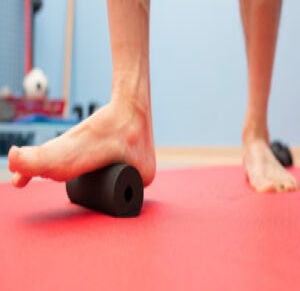Plantar Fasciitis is inflammation of your plantar fascia. The plantar fascia is a tissue that connects the heel with the front of the foot. This type of injury is similar to a tennis elbow just on your foot. As the fascia becomes inflamed and thickens, it can cause a very un-pleasurable and painful experience.
Symptoms for Plantar Fasciitis
You will recognize plantar fasciitis as a stabbing, shooting pain in your heel, especially in the morning or after staying off your feet for a longer period of time. Sometimes, the pain can also be present in the middle part of your foot, but the heel is usually the biggest problem.
Generally, the pain is present in only one foot but sometimes (in unfortunate circumstances) one can have Plantar Fasciitis in both feet. Symptoms can lessen during mild physical activity and almost entirely vanish, only to return when the activity stops and your feet have cooled down.
In many cases, the pain from plantar fasciitis is a slow-growing pain. It takes time for it to develop and many people report that it cleared up for them without any medical attention. Others may suffer from it for years as it turns into a stubborn, chronic disease that prevents people from enjoying many physical activities.
It is difficult to determine the precise cause of plantar fasciitis because there are usually many possible factors present at the same time. However, some may include:
- Bone spurs
- Pronation and flat feet
- Tight calves
People who tend to be at a higher risk of getting plantar fasciitis are menopausal women, women between 40 and 70 years of age, pregnant women in later stages of their pregnancy, people who stand for the better part of their day, those who suffer from obesity, seniors, runners and those who walk on the pavement for many hours consistently.
Trouble with Diagnosis
When trying to diagnose plantar fasciitis, your doctor will ask you about the location of your pain. They will try to recreate your pain by pushing your fascia as you flex your foot. This is because your doctor needs to be sure that it is your fascia that hurts and it’s not another, foot-related problem.
Another thing that they may check is your muscles and reflexes to determine that you don’t have a potential neurological condition that is causing your pain.
It is possible that you may need an ultrasound or MRI to exclude the possibility of other conditions. For differential diagnosis, among others, your doctor may try to exclude the possibility of:
- Stress fracture
- Heel spurs
- Bursitis
- Achilles tendinitis
- Heel bruise
- Plantar fibromatosis
Treatments for Plantar Fasciitis
Plantar fasciitis can be a challenge to cure, you should try resting your feet and applying ice after workouts. You can attempt to find braces that will support our feet. Anti-inflammatory pain killers can also temporarily relieve pain while at a resting state. If you continue to experience pain after these steps you may consider further medications including a PRP injection into the foot.
To soothe the effects of this issue in case of more chronic disease, doctors will usually recommend physical therapy. The goal of physical therapy is to stretch both your plantar fascia and surrounding tendons. Another way to do physical therapy is to do exercises to fortify your muscles which will help you release some of the pressure that your plantar fascia endures.
There is also an option of surgery when it comes to plantar fasciitis. However, the results of surgery are not always 100% positive. Since the surgery involves disconnecting your fascia from the heel, it can result in limited movement. That is why surgery is usually used as a last resort.
Prevention
Since the treatments for plantar fasciitis are not entirely effective for everybody, you should take an agnostic approach to the condition and take the appropriate measures to avoid it completely. Some of the things you can do today to prevent this inconvenient condition include:
- Wear appropriate footwear that offers enough support
- Replace your sports shoes regularly – for runners this means every 400 miles
- Prioritize swimming and cycling instead of running
- Always stretch your feet before straining them
- Maintain healthy weight
Plantar fasciitis is one of those conditions that doesn’t sound too serious, but their impact on your lifestyle can be tremendous. It is one of the most common orthopedic conditions the we treat. For further information or a consultation for Plantar Fasciitis, please reach our to Dr Mahesh Bagwe, your Plantar Fasciitis doctor and specialist.






